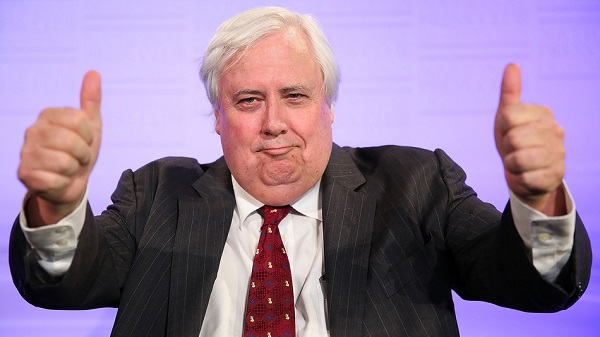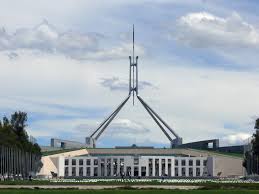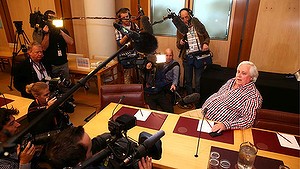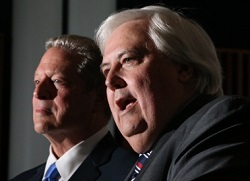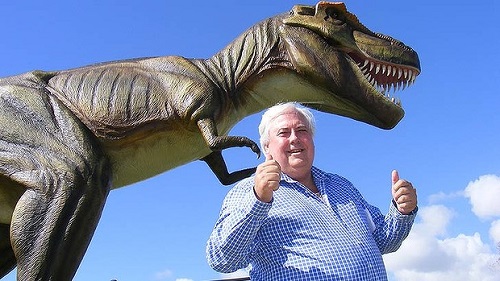
Mark Thursday 10 July as the day the Abbott government achieved the trifecta. They gagged discussion on the carbon price repeal legislation while filibustering so that negotiations could proceed with Clive Palmer’s PUP in the corridor. Then the legislation was voted down.
Why did the Government trip up and score an own goal?
To meet Abbott’s media schedule, that’s why. Penny Wong to the cross-bench:
“We are already having backgrounded to media…what the Senate will be doing. Media are already being told to prepare for the Prime Minister’s announcement, because gag-and-guillotine will be moved, here in this Chamber, to get the bills on and voted on. So I want the crossbench to be clear on what you are being asked to do — you are being asked to run this Chamber so as to accord with Mr Abbott’s media schedule.
Later she called it “a special blend of arrogance and incompetence”.
Apparently it was pre-ordained on Monday that the bills would be passed today, to fit in with Abbott’s media schedule.
As far as I can make out, the problem arose when the PUP looked at the latest amendment overnight and decided it didn’t go far enough. So they came up with a new one, the third version, essentially mandating a 250% penalty for firms and other entities not passing on to customers savings from the repeal of the carbon tax.
When this was sprung in the morning Palmer reckons there was a “violent reaction” from LNP pollies with lots of angry phone calls. Nevertheless the LNP leadership acceded to the new version, but it ran into trouble because it was deemed a money bill which must originate in the House of Representatives.
Somewhere along the line the Government decided to press on with the Mark 2 amendment without telling PUP. That’s according to Palmer:
It doesn’t look like the carbon tax is going to go through in the Senate today, right, because our party will most likely vote against the bill, right.
Of course, this morning at 8.30 we had an amendment which we discussed with the Government and we left with the clerk’s office. It was to be circulated by the time Parliament came down and it hadn’t been circulated.
And our senators hadn’t been told and they were left in the dark so when the gag motion was brought, their old amendment was in there, which they thought was the new amendment, and they would have voted for that and not the critical amendment which is critical in getting electricity and gas prices back to consumers, and then under the misapprehension they would have voted to repeal the carbon tax, right.
But fortunately we discovered that and they were able to become aware of it, so I just met with them down there and their view was that in no circumstances they wouldn’t be voting today for the carbon tax repeal.
Now, of course the matter may be sorted out, I don’t know, but that’s how it stands at the moment. I think you call it double-crossing people.
We went to lodge our amendment at the clerk’s office at 8.30 and we asked that it be distributed and we had a violent reaction from the Government and our amendment nearly…
Then in the final scramble, the LNP promised to originate Palmer’s desired changes next week in the HoR if the PUP would kindly pass the existing defective version. Palmer told the 7.30 Report that he simply didn’t trust them.
The bill will now go back to the HoR and could be back in the Senate on Monday. But will it be passed?
PUP’s amendment is actually problematic and there is no certainty that six cross-benchers will approve it.
Palmer sees the amendment as applying to entities selling electricity and gas:
The list proposed by PUP includes “an individual, a body corporate, a body politics, a partnership, any other incorporated association or body of entities, a trust or any party or entity which can or does buy or sell electricity or gas”.
There is concern that other entities may be drawn in. There is concern that some firms have absorbed the cost of the carbon tax in whole or in part.
There is concern as to whether the Commonwealth can legislate to control firms in the specific manner proposed.
But it seems the Abbott Government will do anything to axe the tax.
People are wondering what the politics of it all means.
Laura Tingle says it’s karma rather than Palmer. Abbott is getting his own medicine back in spades. But
The all or nothing Abbott modus operandi is simply not going to work any more.
Whatever Palmer’s unpredictability, the Coalition team has been exposed as woefully unprepared to deal with what it faces in the upper house.
This is true in both a tactical and strategic sense. Tony Abbott has to reconsider whether his Senate team is up to the job of handling Palmer.
Bernard Keane at Crikey says:
The key to understanding Palmer is that he’s always about what’s ahead. What’s in the past is irrelevant. The issue of consistency simply doesn’t arise, because Palmer eternally moves forward, toward the next announcement, the next stunt. Clive only ever stops moving so he can momentarily bask in the media spotlight. Then it’s onward again.
The Courier Mail has a biographical article on Palmer that everyone should read.
They say he plays a long game and he understands the media. He grew up on the Gold Coast where Russ Hinze was big. Already wealthy he became media director for the National Party in 1986. So he was there in the last days of Joh and during the Fitzgerald inquiry.
I think on the current issue he is genuinely concerned for consumers. But he doesn’t mind making the LNP look chaotic and shambolic. Abbott is going to have to, as Tingle suggests, look for 80% and 90% solutions.
Meanwhile Xenephon thinks the gaggle of cross-bench senators are part of the solution rather than the problem. I’m not sure Eric Abetz is up to handling the situation.
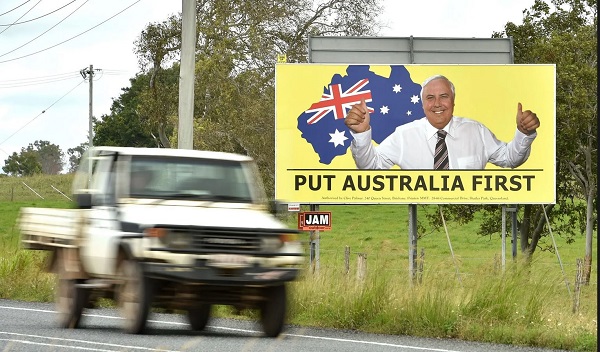

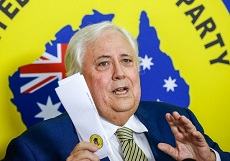
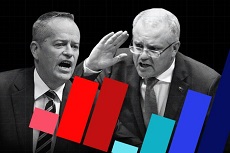
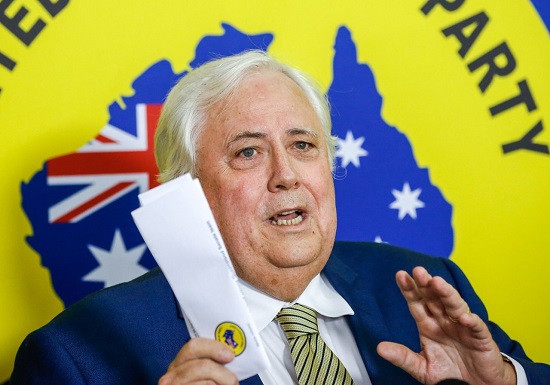

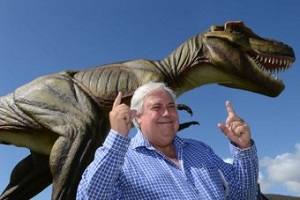 As far as I know Clive Palmer’s two main cash producing assets were Queensland Nickel and the Coolum Resort, known now mainly for the fibreglass dinosaurs he installed all over the place. Coolum is presently shut, and Queensland Nickel has
As far as I know Clive Palmer’s two main cash producing assets were Queensland Nickel and the Coolum Resort, known now mainly for the fibreglass dinosaurs he installed all over the place. Coolum is presently shut, and Queensland Nickel has 





